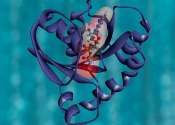Higher temperatures may decrease antidepressant pollution in waterways
A new study led by Monash University biologists has found that higher temperatures may reduce effects of antidepressant pollution on wildlife.

A new study led by Monash University biologists has found that higher temperatures may reduce effects of antidepressant pollution on wildlife.
Ecology
Feb 9, 2022
0
50

A multi-enzyme platform is developed for sequence-unconstrained traceless protein synthesis and modification with either synthetic peptides or recombinant proteins, according to a new study out of Chinese Academy of Sciences ...
Biochemistry
Oct 22, 2021
0
23

University of Central Florida researchers have developed a nanoparticle-based disinfectant that can continuously kill viruses on a surface for up to seven days—a discovery that could be a powerful weapon against COVID-19 ...
Nanomaterials
Sep 1, 2021
0
1096

Researchers at the University of Illinois Chicago have developed a novel continuous-flow microfluidic device that may help scientists and pharmaceutical companies more effectively study drug compounds and their crystalline ...
Materials Science
Jun 8, 2021
0
20

Researchers from Bochum and Osnabrück have gained new insights into the structure of the Ras protein, which acts as a molecular switch for cell growth and is involved in the development of cancer. With the help of fluorescence ...
Biotechnology
Jun 2, 2021
0
7

New collaborative research from Northwestern University and Lund University may have people heading to their backyard instead of the store at the outset of this year's mosquito season.
Plants & Animals
Mar 4, 2021
1
327

Gels are formed by mixing polymers into fluids to create gooey substances useful for everything from holding hair in place to enabling contact lenses to float over the eye.
Polymers
Feb 4, 2021
0
29

For some years, an active substance from the leaves of an ornamental plant has been regarded as a possible forerunner of a new group of potent drugs. So far, however, it has been very laborious to manufacture it in large ...
Cell & Microbiology
Jan 11, 2021
1
86

Chemists at Martin Luther University Halle-Wittenberg (MLU) have developed a way to integrate liquids directly into materials during the 3-D printing process. This allows, for example, active medical agents to be incorporated ...
Materials Science
Dec 16, 2020
0
86

People can continue using mineral-based aerosol sunscreens without fear of exposure to dangerous levels of nanoparticles or other respirable particulates, according to Penn State research published in the journal Aerosol ...
Bio & Medicine
Dec 2, 2020
0
155